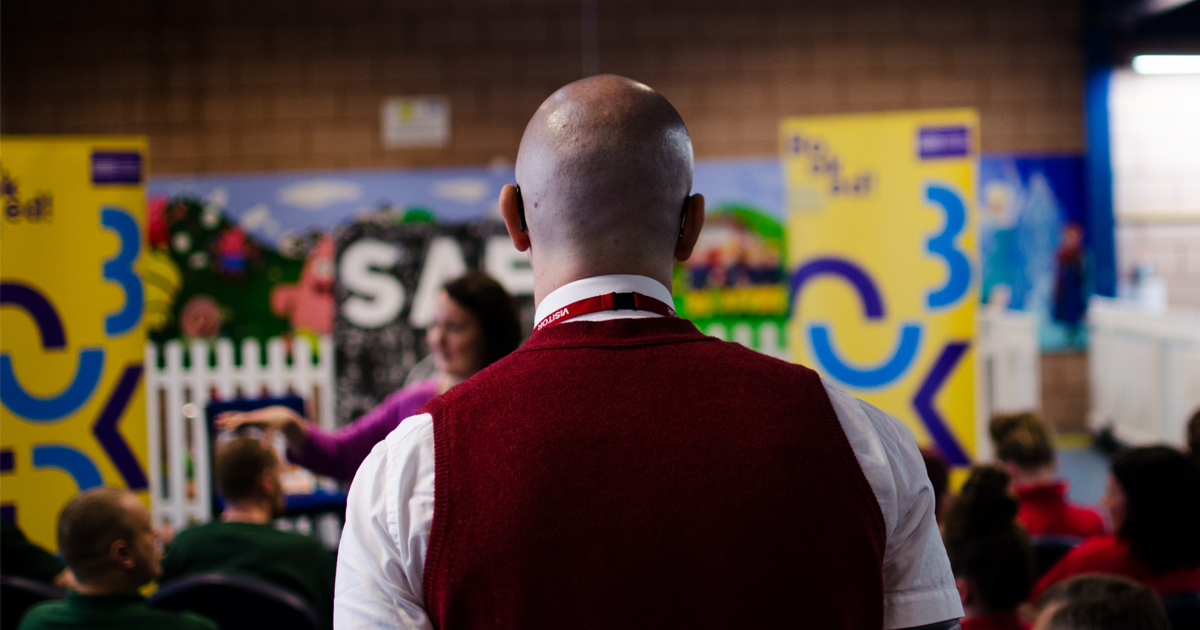A highlight of the year-round Booked! programme, our work in Scotland’s prisons has been stimulating and rewarding for offenders, authors and staff alike. Here, Projects Manager Casi Dylan considers its progress so far, and its future development.

Ryan Gattis – tall, tattooed, in jeans, cardigan and tie – stands in front of an audience at HMP Greenock and begins his talk by recounting the time when as a high-school teenager his nose was broken so badly that his nasal cartilage was knocked out of his skull and deposited on his left cheek.
“It was an elbow that did it. A football player who had dropped acid earlier in the day wanted to play-fight with me, and even though I told him no, I was stupidly turning away as he swung.”
With that, he has them. It’s not so silent that you can hear a pin drop: even here in the relative comfort of the carpeted Visitor Room that’s a privilege disallowed by the clanking prison around us. But for an hour – as Ryan shares the story of his life, his recovery, his becoming a writer – the space and our encounter within it is charged with a different possibility. The queue at the end isn’t for the sandwiches and juice, laid on especially for the event. It’s for Ryan. They want his book signed. They want to shake his hand.
Ryan is an LA-based author and educator, and one of the six authors and illustrators who joined us in our programme of events in Scottish prisons this August. Having previously held events in HMP Edinburgh and HMP Greenock, this summer we expanded our programme to include HMP Grampian, situated on the coast just outside Peterhead. As might be expected, crime writing is perennially popular in such settings. Ryan – whose latest novel Safe is a heist thriller set in South Central Los Angeles – along with novelists Stuart MacBride and Jake Arnott didn’t disappoint their respective audiences in this regard. But beyond this, the point of interest in these events is the broader conversations made possible through such literary encounters. It’s discussing the morality of engaging with real-life gang members, as Ryan does in LA, and of representing their stories in your writing honestly and sympathetically. It’s recognising a sense of place, inspired by Stuart MacBride’s strong Aberdonian identity. It’s questions of language and power as seen through Arnott’s use of eighteenth-century underworld patois in The Hanging Tree. After overcoming an intriguing combination of bravura and shyness, the discussions are open, unfiltered: there is little experience of or care for those unspoken ‘book event rules’ that regular audiences adhere to, limited patience for neatly allotted question time. One assumes that time has taken on a new meaning here.
As well as events aimed at the adult prison population, this year we also piloted Visitor Room author events – special sessions designed for children, which they attended alongside their parents as part of their visiting and bonding time. Julian Clary, along with David Roberts, the illustrator of his The Bolds series, ran an interactive session at HMP Edinburgh, whilst author Emily Dodd ran a reading and craft session based on her book Ollie and the Otter at HMP Grampian. Responses to these sessions has been overwhelmingly positive from the families, authors, publishers and prison staff alike, not least because it felt like new territory for all of us: none of us had tried something like this before. The previous day, Julian and David had entertained a full house of children in Charlotte Square Gardens’ Main Theatre. Here, in the company of seven expectant families huddled into the corner of a vast visiting space, suddenly their task seems very different. Prepared gags built around their PowerPoint slides don’t go down as well as when they move from behind their desk and make a closer connection with the children: “What kinds of things would you take on holiday with you?”, “What else shall we draw on Mrs Bold’s stupendous holiday hat?” At the end of the session Julian hands out special jute bags to each of the children, made by their parents during their classes, personalised with each child’s initial. In them is a copy of The Bolds on Holiday to keep.
There was some concern during our planning that programming an event into that precious visiting time was a risk, overbearing somehow. From the feedback we’ve received, we’re delighted to hear that that hasn’t been the case, and that the impact of the sessions has already outlived its hour duration. As Pam Simpson, Practice Team Leader at the Family Centre & Help Hub at HMP Grampian told us:
“Offering children visiting their mum or dad in prison an opportunity to engage with a book and creating a session which was engaging, fun and interactive within the confines and restraints of a prison visit was fantastic. Creating opportunities for prisoners to have as many different experiences with their children has a major impact on the family in the community and the prisoners themselves: it has been found to be one of the main ways to reduce reoffending when a prisoner is released.
They were delighted with the gift of a book. Two of the children independently took their books into school and nursery to share their experience with their class, enabling them to have a positive experience about visiting mum or dad in prison, reducing the stigma and the feeling that this should be hidden and not spoken about.”
It’s this long-term impact, this opportunity to celebrate shared experience whatever your circumstances, which we’re now determined to develop further in our prison work for 2018 and beyond. How can we ensure a legacy for this work beyond one-off events? How do we extend and deepen the connection with families who have experience of incarceration, and welcome them to all Edinburgh International Book Festival events? How do we build a clearer, stronger connection between our work inside and outside prison walls? Whilst these questions hover over our future planning, there is one thing we know for sure through our experience of the work in prisons: there is a special need for stories here.
Photo: Ryan Gattis in HMP Greenock. Provided by Stephen Noble.
Share this Post
